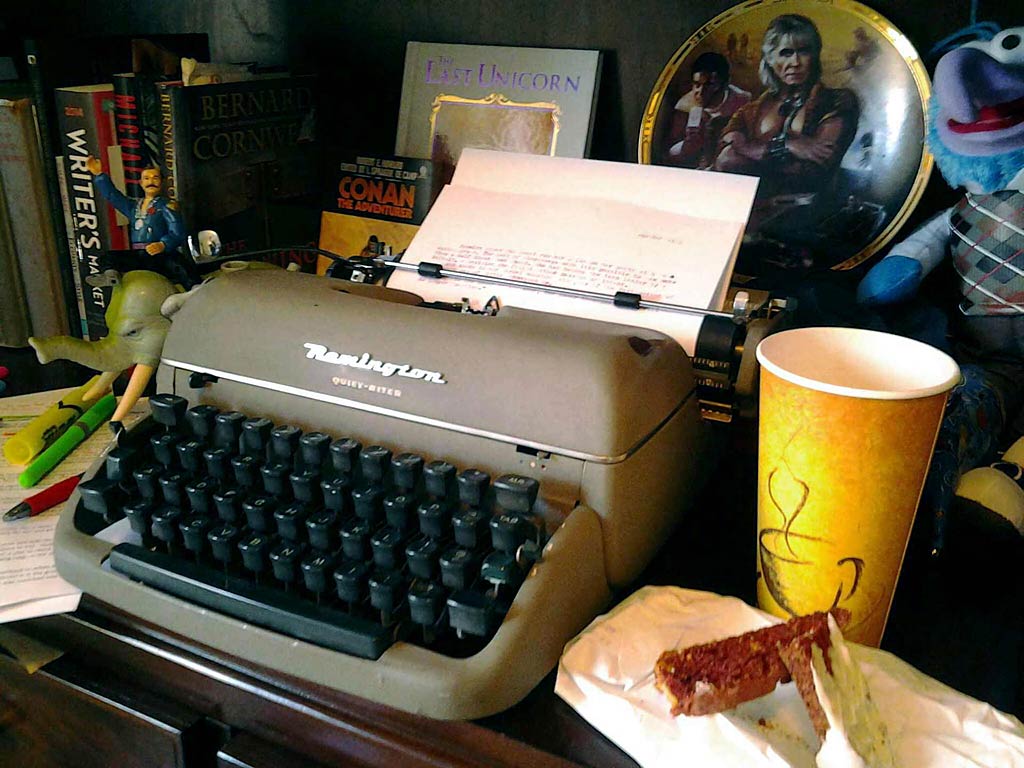The writer who writes with a Master Theme will produce a work deeper, richer and more engaging than the writer who writes without one.
In the same train of thought, the writer who writes with a solid understanding of his Core Concept will work from even higher ground.
I go into the Core Concept in detail in Storycraft for Comics, but in a nutshell, you can think of your Core Concept as the heart of the story concept (the central element that drives the story)… or perhaps, as a more accurate metaphor, as the gravity that holds the story together.
Just like gravity in the real world keeps everything grounded and creates an environment for life to flourish, the gravity in your story follows suit. Without it, your story is likely to float off into the cold, loneliness of deep space and die…
So what exactly is story gravity?
Simply put, it’s the reason you’re writing the story, the essence that attracts you to the story (and often the unique element that separates it from other stories).
Imagine starting off to write a 6 issue mini-series or a full length novel and not having a clear grasp of what really makes the story special in your own eyes…
What really entertains and engages you as the creator.
If you don’t even know what that is, how can you possibly convey it to the readers? And convey it consistently issue after issue? (Subconscious osmosis, perhaps? #sarcasmfont)
When you sit down to find the clarity of your Core Concept, don’t make the mistake of centering your story’s gravity around a superficial element.
“I’m writing a super hero kung fu story, so my gravity is a lot of cool kung fu.”
“I just wana do a really dark book about a serial killer…”
The gravity of your story world is only as strong as you make it.
If it’s based on superficial elements, there simply won’t be enough energy to hold everything together.
At best, you’ll be swimming in the waters of a spectacle script, at worst, you’ll be working on a shallow, unengaging story.
Ok so even if you’re not a kung fu fan, stop and just think about it for a second.
Does “a lot of cool kung fu action” immediately give creative direction? Is it a well spring of scenes and character development?
Well, I’m a big kung fu guy and I’d personally answer no… (immediately my brain starts digging, trying to find something more tangible to springboard off of.)
The superficial things about a story are only momentarily entertaining, the deeper meanings and currents are the elements that really engage and entertain.
So maybe on this super hero kung fu story, the real gravity of the story is the hero’s personal loss of integrity and his quest to regain honor for his school.
Now pause again and think about that gravity for a second.
Does that one kick up some creative direction? Do any scenes or openings for character development come to mind? For me, the answer is absolutely.
- How did the school lose its honor?
- What were the repercussions of that loss?
- How was the hero’s integrity tied in? Did he break certain laws?
- How did it affect him, emotionally, spiritually?
All these questions are jumping off points, possible paths to explore… Notice each of them is broad in nature, giving direction that doesn’t simply pose a one-time, black and white answer, but rather offers a multi-faceted path to explore.
Now here’s the real key of working with a story’s gravity…
Once you define the gravity of the story world, you’ve got to stick with it.
This is the core bit that makes your story shine.
Every second you step away from it, you’re floating off into space… destination cold, dark, lifeless oblivion.
So if our story is a kung fu hero’s loss of integrity and his quest to regain honor for his school, and in issue two we send our hero out on a sting operation to nab local drug dealers (just because we think it’s gonna be cool to look at), our gravity is thinning.
Notice that the gravity of your story is NOT a direct/specific goal or beat.
We’re not saying the gravity of the kung fu story is to compete in a fighting tournament and win… We’re NOT saying every scene, every page of the book needs to focus on this.
Instead we’re recognizing the core aspect–the element and essence that attracts and entertains us… AND THIS, this is what we’re going to tie into every scene.
Notice that the gravity of your story is NOT your Master Theme.
Though the two will often be closely related. The Master Theme is the thing you want to say with your story, maybe in our kung fu story, “Is restoring honor worth paying any price?”
But that Master Theme is a reflection of the essence we find engaging and entertaining in our story. It’s not the thing itself.
Though focusing on your Master Theme will rarely lead you astray, anchoring it in with gravity will only serve to make the story that much better. Take the time to find the gravity of your story and never let the narrative float off into space. The power of taking your time at the beginning of your story and defining your Core Concept, should not be underestimated. ▪
About the Author —
Nick Macari is a full-time freelance story consultant, developmental editor and writer, working primarily in the independent gaming and comic markets. His first published comic appeared on shelves via Diamond in the late 90’s. Today you can find his comic work on comixology, amazon and in select stores around the U.S. Visit NickMacari.com for social media contacts and news on his latest releases.
